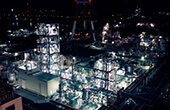Everyone wants to enjoy wholesome food and live a healthy life. By tackling challenges in the health & crop sciences field, the Sumitomo Chemical Group is making this possible for more people. Leveraging its excellent expertise in organic synthetic chemistry, biology, and formulation technology, the company is developing new crop protection chemicals, functional fertilizers, and cultivation techniques, as well as more effective insecticides for household or professional applications, with the aim of realizing healthy and hygienic lifestyles, increasing food production, and improving agricultural efficiency.
Recognizing that “Regenerative Agriculture” is destined to play an increasingly prominent role in the health & crop sciences field, the Sumitomo Chemical Group is offering the world environmentally friendly crop protection products and materials derived from natural sources in addition to conventional synthetic crop protection products. Sumitomo Chemical’s Health & Crop Sciences Sector is spearheading commercialization of these products derived from natural sources. In cooperation with the three companies addressing this sector, Sumitomo Chemical Garden Products, SC Environmental Science, and Sumika Technoservice, in 2023 Sumitomo Chemical launched a branding campaign for Natural Products using active ingredients derived from natural sources to make this business known throughout society.
With “Natural POWER for the world” as their slogan, the companies participating in this project have been advertising extensively in print media, digital media and in TV commercials in Japan. To raise recognition of the products derived from natural sources of Sumitomo Chemical Group companies, all these products bear the “Natural Products” logo. By promoting these products far and wide, the Group is seeking to grow the business.
The companies participating in this project offer around 30 types of products derived from natural sources, including crop protection products, household and professional insecticides, and gardening products.
A relatively new concept, “Regenerative Agriculture” aims to make farming sustainable by restoring and improving soil health, while also reducing greenhouse gas emissions and maintaining and enhancing biodiversity. “Regenerative Agriculture” is a response to several pressing social issues.
One issue is how to ensure the stable supply of food necessary to support the world’s rapidly growing population. According to the State of World Population report 2024 published by the United Nations Population Fund (UNFPA) in April 2024, the world population exceeded 8.1 billion in 2024 and is projected to reach 9.7 billion in 2050, according to estimates by the Population Division of the United Nations Department of Economic and Social Affairs (UNDESA). Going forward, amid concerns about changes in arable land and water scarcity due to climate change, new ways of increasing crop yields per unit area are needed to ensure the stable supply of food.
On the other hand, the agricultural workforce in Japan is shrinking rapidly. According to the Census of Agriculture and Forestry, a survey conducted every five years by the Ministry of Agriculture, Forestry and Fisheries, whereas 2.24 people were primarily engaged in agriculture in 2005, the number had shrunk to 1.36 million by 2020, and there are projected to be as few as 1 million farmers by 2024. Moreover, 70% of farmers are aged 65 or older. Given the declining population in Japan and the serious shortage of farmers, improvement of efficiency in the agricultural sector is urgently required. Along with measures such as promotion of “smart agriculture,” expectations for synthesized crop protection products such a pesticides with far better performance and lower toxicity, which can lead to higher yields, are increasing.
Another social issue is the need to protect the environment. It is necessary to curb global greenhouse gas emissions, reduce environmental pollution, and safeguard the biosphere. People’s eco-consciousness centering on achievement of the Sustainable Development Goals (SDGs) is rising throughout society. As a result, there are increasing needs for more environmentally friendly products in various fields, such as for pest and disease control in agriculture and gardening and for pest control and sanitation in household and professional fields.
The Sumitomo Chemical Group defines "biorationals" as crop protection products and solutions derived from natural sources, such as microbial pesticides that protect crops from pests, and plant growth regulators and biorational rhizosphere materials that improve crop quality and yield, and has commercialized these products. In addition, the Group offers a wide range of botanical products, which contain insecticidal ingredients extracted from plants with its unique technologies.
Both products chemically synthesized and derived from natural sources are essential to drive "Regenerative Agriculture” and should be used in a well-balanced manner. The Sumitomo Chemical Group, having a variety of products and technologies, believes that it can meet these needs not only with the chemical synthesis technologies that have been developed over the years, but also by combining these with its prowess in biorational technologies and products, botanical products, and other expertise. This approach is aligned with the Strategy for Sustainable Food Systems, MIDORI, promoted by the Ministry of Agriculture, Forestry and Fisheries, which aims to reduce the use of chemical pesticides (risk equivalent) by 50% by 2050 through the development of novel alternatives.
Sumitomo Chemical’s Health & Crop Sciences Sector sets three fields to be addressed in its long-term vision. Firstly, “food.” The objective is to solve food issues through increased food production, sustainable agriculture, and the provision of safe and reliable agricultural products. Secondly, “health and hygiene.” The company will continue to offer insecticides and insecticidal products that protect people from malaria and other vector-borne diseases, thus improving hygiene and helping people lead healthy lives. Thirdly, the “environment.” The company will improve the quality of the living environment by offering excellent insecticides and insecticidal products in the household and professional fields to exterminate harmful pests in the home and throughout society. Under this long-term vision, Sumitomo Chemical is promoting R&D across these three fields, and expanding its sustainable product business through innovation and business creation that will differentiate the company from its competitors.
Globally, the promotion of “Regenerative Agriculture” for a sustainable society is gaining momentum. In particular, the objective of the EU’s Farm to Fork Strategy launched in 2020 is a sustainable food system extending from producer to consumer. The Japanese government, with the Strategy for Sustainable Food Systems, MIDORI, targets both increased productivity and sustainability through innovation. The three elements of the long-term vision of Sumitomo Chemical’s Health & Crop Sciences Sector are in step with these global trends.

 EN
EN


 Journalist Junichiro Hori on Sumitomo’s DNA
Journalist Junichiro Hori on Sumitomo’s DNA



